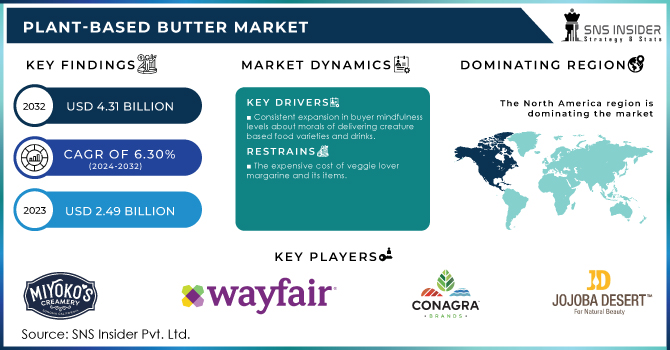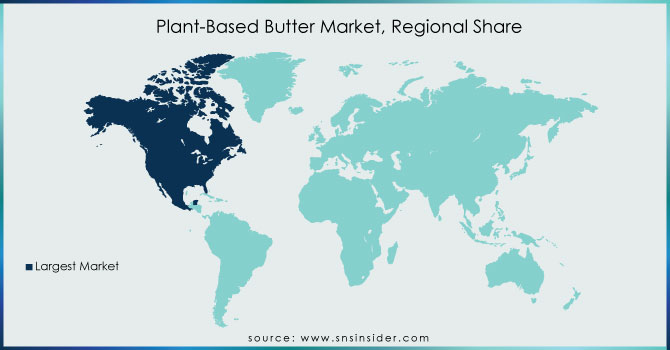Plant-based Butter Market Report Scope & Overview:

Get more information on Plant-Based Butter market - Request Free Sample Report
The Plant-Based Butter market was valued at USD 2.49 billion in 2023 and is projected to grow to USD 4.31 billion by 2032, showing a 6.30% CAGR from 2024 to 2032.
Plant-based butter is a non-dairy margarine substitute, which is made by consolidating the plant-based oil, additives, seasoning specialists, emulsifiers and water. It is practically like ordinary margarine in surface and taste and is profoundly wholesome.
The flooding veggie-lover populace across the globe expands the interest for the utilization of plant-based butter as most would consider to be normal to elevate the general interest for worldwide plant-based margarine market over the estimated time of 2021 to 2028. The ascent in mindfulness connected with creature mercilessness and its unfriendly natural impact is supposed to act as preeminent drivers for the worldwide plant-based butter market at a worldwide level. Nonetheless, the exorbitant cost of veggie lover margarine and its items are projected to go about as a limitation towards the development of the market, though the vacillation in costs of unrefined substances, for example, nuts and vegetables can challenge the development of the plant-based butter market.
In addition, the development and changes in the assortment of flavors by the central members established is expected to additionally create new open doors for the plant-based margarine market in the figure time of 2021 to 2028.
Market Dynamics:
Driving Factors:
-
Consistent expansion in buyer mindfulness levels about morals of delivering creature-based food varieties and drinks.
-
The effect of creature farming on the climate.
Restraining Factors:
-
The expensive cost of veggie lover margarine and its items.
Opportunities:
-
Limitations on the food administration area has made home cooking.
-
The ascent in mindfulness connected with creature savagery and its antagonistic natural impact.
Challenges:
-
The variance in costs of unrefined substances like nuts and vegetables.
Impact of Covid-19:
Coronavirus pandemic profoundly affected the food and refreshments industry, as confusion in worldwide inventory chains and exchange boundaries all around the world subsequently influenced the development of plant-based food items and fixings. Besides, because of lockdown in numerous nations caused an interruption in retail area and the shoppers were ready to purchase just vital items. Nonetheless, the decreased utilization of out-of-home food, and home cooking turned out to be more well known as a possibility for investment funds and set out potential income age open doors for the market during this period.
Key Market Segments:
By Nature:
- Organic
- Conventional
By Application:
- Food and Beverage Industry
- Food Premixes
- Soups and Sauces
- Bakery
- Prepared
- Packaged Food
- Foodservice Industry
- Household
- Retail
By Source:
- Plant-based Milk
- Almond
- Coconut
- Olive oil
- Canola
- Palm Fruit
- Vegetable Oil
- Others
By Distribution Channel:
- B2B
- Hotels
- Restaurants
- Cafes
- B2C
- Hypermarket/Supermarket
- Convenience Stores
- Specialty Stores
- Mom
- Pop Stores
- Discount Stores
- Food & Drink Specialty Stores
- Independent Small Groceries
- Online Retail
- Others
Plant based margarine alludes to a butter produced using plant removes including almond, soy, coconut, and vegetable oils. Margarine is the most ordinarily involved item for preparing by purchasers and food makers. The greater part of the butter items is milk-based items with weighty soaked fat and cholesterol, which can advance extra fat in the human body. Plant based margarine is moderately low in immersed fat and tastes like milk margarine, and can be utilized for cooking, baking, and buttering. Plant-based butter can be utilized in pre-blended suppers, soups, hotdogs, bread shops, frozen and handled food sources, in the food service business, the family area, and others.
Regional Analysis:
The worldwide plant-based butter market is additionally fragmented in view of topography including North America (the US, and Canada), Europe (Italy, Spain, Germany, France, and Others), Asia-Pacific (India, China, Japan, South Korea, and Others), and the Rest of the World (the Middle East &Africa, and Latin America). The market can be examined for specific area or nation level according to the prerequisite. Among these, the North America territorial market is supposed to cater impressive development over the conjecture time frame, attributable to the rising tendency of the populace towards the reception of regular items.

Get Customized Report as per your Business Requirement - Request For Customized Report
North America
-
USA
-
Canada
-
Mexico
-
Europe
-
Germany
-
UK
-
France
-
Italy
-
Spain
-
The Netherlands
-
Rest of Europe
Asia-pacific
-
Japan
-
South Korea
-
China
-
India
-
Australia
-
Rest of Asia-pacific
The middle east & Africa
-
Israel
-
UAE
-
South Africa
-
Rest of middle east & Africa
Latin America
-
Brazil
-
Argentina
-
Rest of Latin America
Key Players:
Miyoko’s Creamery, WayFare, I Can’t Believe It’s Not Butter, Conagra Brands Inc., Naturli Foods, Goodmylk, Califia Farms LLC, Upfield , NOW Foods, Live Yum, VeganFirst, Nuflower Foods, Jojoba Desert , Alpro, Beyond Meat, and Earth’s Own Food Company Inc.
| Report Attributes | Details |
|---|---|
| Market Size in 2023 | US$ 2.49 Billion |
| Market Size by 2032 | US$ 4.31 Billion |
| CAGR | CAGR 6.30% From 2024 to 2032 |
| Base Year | 2023 |
| Forecast Period | 2024-2032 |
| Historical Data | 2020-2022 |
| Report Scope & Coverage | Market Size, Segments Analysis, Competitive Landscape, Regional Analysis, DROC & SWOT Analysis, Forecast Outlook |
| Key Segments | • by Nature (Organic, Conventional) • by Application (Food and Beverage Industry (Food Premixes, Soups and Sauces, Bakery, Prepared and Packaged Food), Foodservice Industry, Household/Retail) • by Source (Plant-based Milk, Almond, Coconut, Olive oil, Canola, Palm Fruit, Vegetable Oil, Others) • by Distribution Channel (B2B (Hotels, Restaurants, Cafes) • by B2C (Hypermarket/Supermarket, Convenience Stores, Specialty Stores, Mom, and Pop Stores, Discount Stores, Food & Drink Specialty Stores, Independent Small Groceries, Online Retail, Others) |
| Regional Analysis/Coverage | North America (USA, Canada, Mexico), Europe (Germany, UK, France, Italy, Spain, Netherlands, Rest of Europe), Asia-Pacific (Japan, South Korea, China, India, Australia, Rest of Asia-Pacific), The Middle East & Africa (Israel, UAE, South Africa, Rest of Middle East & Africa), Latin America (Brazil, Argentina, Rest of Latin America) |
| Company Profiles | Miyoko’s Creamery, WayFare, I Can’t Believe It’s Not Butter, Conagra Brands Inc., Naturli Foods, Goodmylk, Califia Farms LLC, Upfield , NOW Foods, Live Yum, VeganFirst, Nuflower Foods, Jojoba Desert , Alpro, Beyond Meat, and Earth’s Own Food Company Inc. |
| Key Drivers | •The effect of creature farming on the climate. |
| Restraints | •The expensive cost of veggie lover margarine and its items. |

